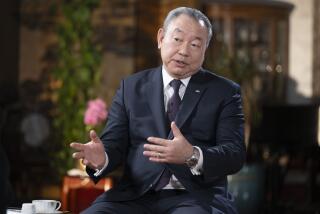Don’t Bet on Better Ties With China, Taiwan Says
TAIPEI, Taiwan — President Chen Shui-bian warned Monday that Taiwan cannot count on better relations with Beijing just because Jiang Zemin has stepped aside as China’s top military leader.
“We absolutely must not harbor any wishful thinking or unrealistic expectations,” Chen said at a ceremony honoring Taiwan’s military. “The security of the country is in our hands. We cannot hope for the enemy’s goodwill or the aid of external forces.”
Beijing announced Sunday at the end of a four-day Communist Party meeting that President Hu Jintao, 61, would replace former President Jiang, 78, as head of the powerful Central Military Commission. This paves the way for Hu to further consolidate his power and gives China a more unified leadership structure.
Chen’s speech echoed the view of many analysts on both sides of the Taiwan Strait that Hu is unlikely to alter China’s policy on Taiwan any time soon, despite his reputation as a more deliberative, moderate figure than his predecessor. Taiwan has enjoyed de facto independence since China’s civil war ended in 1949, but Beijing considers it a renegade province that must eventually be reunited with the mainland -- by force if necessary.
“Jiang’s stepping down won’t change the fundamental policy toward Taiwan because the party and the government consider the national interest first,” said Ni Lixiong, a foreign policy expert with the East China University of Science and Technology in Shanghai. “Whether dove or eagle, once they’re in power, leaders adopt a rational view in dealing with this issue.”
Beijing sought to reinforce this message of continuity Sunday in a party communique that said Jiang’s long-standing principles on Taiwan would remain the bedrock of Chinese policy. And Monday, Jiang appeared on state-run television in military uniform to reiterate the message.
“On the Taiwan issue, we should, with the greatest sincerity, make the greatest efforts to realize the peaceful unification,” he said. “But we can never promise to give up the use of force. This is a very important political choice.”
If history is any judge, it could take years for Hu to put a distinct imprint on cross-strait relations even if he wanted to, said George Tsai, a China expert at National Chengchi University in Taipei. Jiang didn’t issue his eight-point proposal on Taiwan -- which blended existing ideas such as peaceful reunification and the “one-China” policy with calls for greater cultural and economic exchanges and improved dialogue -- until 1995, six years after he became head of the Communist Party, Tsai noted.
Taiwan is also warily watching changes to China’s military structure announced Sunday. Traditionally, army officers have held the top positions in the military hierarchy, but now senior navy, air force and artillery officials will sit beside their army counterparts on the Central Military Commission.
Analysts said this reflects China’s ongoing effort to create a leaner, more mobile military as well as a recognition of the role these other services would play in any Taiwan conflict.
The individuals promoted -- the navy commander, Vice Adm. Zhang Dingfa; the air force commander, Qiao Qingchen; and the artillery corps commander, Lt. Gen. Jing Zhi-yuan -- all have experience planning and carrying out military exercises based on a presumed attack on Taiwan, said Andrew Yang, a military analyst with the Chinese Council of Advanced Policy Studies in Taipei.
“Their military is being transformed into a more professional institution focused on technology and command-and-control capability,” he said.
“In particular, it’s very centered on Taiwan. The newly promoted members were all involved in the 1996 missile crisis,” when China fired projectiles into the waters off Taiwan ahead of the island’s first direct presidential election.
Though China has signaled its willingness to wait decades for reunification, it worries Chen will declare independence. If that happens, Beijing argues, it will have no choice but to take military action.
More to Read
Sign up for Essential California
The most important California stories and recommendations in your inbox every morning.
You may occasionally receive promotional content from the Los Angeles Times.










